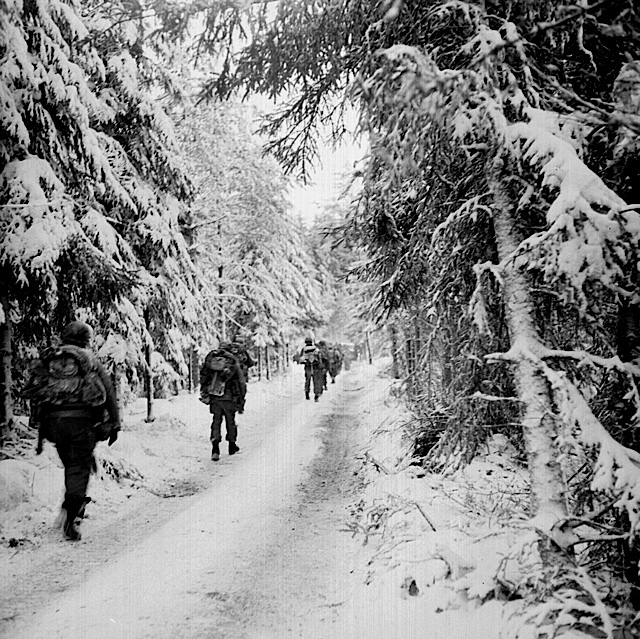The Battle of Hürtgen Forest took place from September 19 to December 16, 1944 and was fought between American and German forces. The Hürtgen Forest is located about three miles east of the German-Belgian border and is thickly wooded, with deep valleys throughout. American forces hoped to keep the Germans from strengthening their defensive lines north of Aachen, after the American victory there in October 1944. The Germans, however, needed to bring Allied movement deeper into Germany to a standstill. The result of these two objectives clashing would consequently contribute to the longest battle of WWII fought in Germany, and the longest battle the U.S. Army has ever been a part of. In the end, the Germans were successful in handing the Americans one of the worst defeats they had ever suffered.
After the U.S. Army’s success at the Battle of Aachen, the Americans had successfully pierced the German defensive line, known as the Siegfried Line, opening up their ability to move further into Germany. Their next move was to go north toward Cologne, but first, American General Courtney Hodges believed they needed to secure the Hürtgen Forest to ensure safety on the Army’s flanks when attacking further north. Fighting began on September 19 when American forces began trying to make their way into the southern end of the forest, but were repeatedly pushed back by the difficult terrain consisting of ridgelines and ravines, as well as the fortified German defenses. A separate infantry division managed to take the nearby town of Lammersdorf early in the fighting, but quickly became stuck there and soon suffered heavy casualties. After taking nearly 4,500 casualties by late October, the division had to be replaced. With various divisions struggling to move forward and losing men quickly, a new plan of attack was formulated. The plan was to move troops through the Stolberg Corridor, a northern passage in the forest. In order to divert German forces from the area, one American division at the southern end of the forest would attack at the Kall River gorge. The southern distraction was to take place on November 2, and the northern troop movements were set for November 5. However, the group of troops meant to move through the northern passage were not prepared in time and postponed their attack until November 16, but the date of the attack in the south was not changed to correspond with this readjustment.
The southern attack moved forward and after some intense fighting they managed to take their objective, the town of Schmidt, on November 3. However, almost immediately after taking the town, the Germans began to counterattack. This along with the postponed northern movements left the American troops unable to make any forward progress throughout the forest. The result was more standstill fighting, which brought extensive casualties to both sides throughout the following weeks that the battle continued. On December 16, however, the Germans launched the Ardennes Offensive south of Hürtgen, a surprising turn of events to the Allied forces. As they then became entirely preoccupied with holding off German forces at the Battle of the Bulge, the Allied forces’ fighting at Hürtgen effectively came to a halt, thereby finally ending the battle.
The Battle of Hürtgen Forest was a defensive success for the Germans, as they managed to stop the Allies in their tracks. Overall, the Americans would suffer anywhere from 33,000 to 55,000 casualties at Hürtgen, while the Germans suffered 28,000. Although the battle was a hard defeat for American forces, the eventual victory at the Battle of the Bulge would lead to the Allies successfully securing Hürtgen in February 1945.
Suggested Reading:
Charles MacDonald, The Battle of Huertgen Forest, (University of Pennsylvania Press, 2003)
PBS: The Battle of Hürtgen Forest
United States Holocaust Museum: The Battle of Hürtgen Forest








